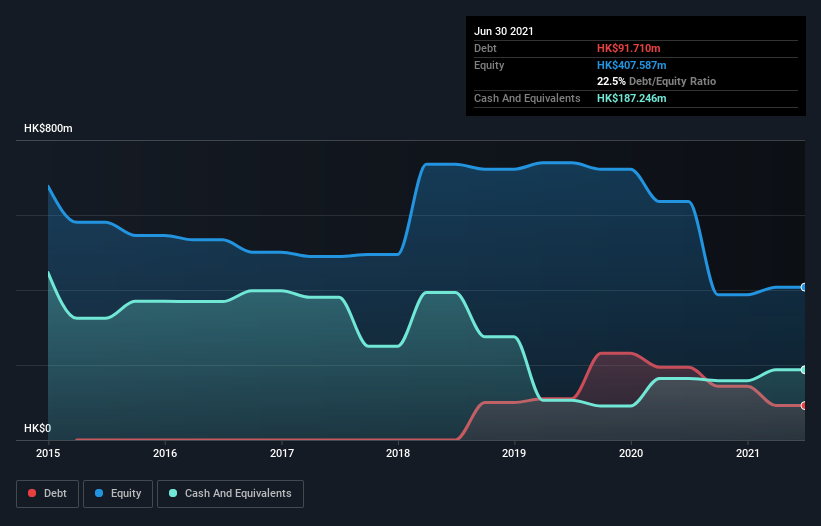David Iben put it well when he said, 'Volatility is not a risk we care about. What we care about is avoiding the permanent loss of capital.' When we think about how risky a company is, we always like to look at its use of debt, since debt overload can lead to ruin. We note that Bison Finance Group Limited (HKG:888) does have debt on its balance sheet. But is this debt a concern to shareholders?
Why Does Debt Bring Risk?
Debt is a tool to help businesses grow, but if a business is incapable of paying off its lenders, then it exists at their mercy. In the worst case scenario, a company can go bankrupt if it cannot pay its creditors. However, a more usual (but still expensive) situation is where a company must dilute shareholders at a cheap share price simply to get debt under control. By replacing dilution, though, debt can be an extremely good tool for businesses that need capital to invest in growth at high rates of return. The first thing to do when considering how much debt a business uses is to look at its cash and debt together.
Check out our latest analysis for Bison Finance Group
How Much Debt Does Bison Finance Group Carry?
As you can see below, Bison Finance Group had HK$91.7m of debt at June 2021, down from HK$194.0m a year prior. But on the other hand it also has HK$187.2m in cash, leading to a HK$95.5m net cash position.

A Look At Bison Finance Group's Liabilities
The latest balance sheet data shows that Bison Finance Group had liabilities of HK$177.6m due within a year, and liabilities of HK$7.72m falling due after that. Offsetting these obligations, it had cash of HK$187.2m as well as receivables valued at HK$114.8m due within 12 months. So it actually has HK$116.7m more liquid assets than total liabilities.
This surplus strongly suggests that Bison Finance Group has a rock-solid balance sheet (and the debt is of no concern whatsoever). Having regard to this fact, we think its balance sheet is as strong as an ox. Succinctly put, Bison Finance Group boasts net cash, so it's fair to say it does not have a heavy debt load! The balance sheet is clearly the area to focus on when you are analysing debt. But you can't view debt in total isolation; since Bison Finance Group will need earnings to service that debt. So when considering debt, it's definitely worth looking at the earnings trend. Click here for an interactive snapshot.
In the last year Bison Finance Group had a loss before interest and tax, and actually shrunk its revenue by 82%, to HK$91m. That makes us nervous, to say the least.
So How Risky Is Bison Finance Group?
Although Bison Finance Group had an earnings before interest and tax (EBIT) loss over the last twelve months, it generated positive free cash flow of HK$71m. So although it is loss-making, it doesn't seem to have too much near-term balance sheet risk, keeping in mind the net cash. We'll feel more comfortable with the stock once EBIT is positive, given the lacklustre revenue growth. There's no doubt that we learn most about debt from the balance sheet. But ultimately, every company can contain risks that exist outside of the balance sheet. Be aware that Bison Finance Group is showing 3 warning signs in our investment analysis , and 1 of those can't be ignored...
At the end of the day, it's often better to focus on companies that are free from net debt. You can access our special list of such companies (all with a track record of profit growth). It's free.
Valuation is complex, but we're here to simplify it.
Discover if Bison Finance Group might be undervalued or overvalued with our detailed analysis, featuring fair value estimates, potential risks, dividends, insider trades, and its financial condition.
Access Free AnalysisThis article by Simply Wall St is general in nature. We provide commentary based on historical data and analyst forecasts only using an unbiased methodology and our articles are not intended to be financial advice. It does not constitute a recommendation to buy or sell any stock, and does not take account of your objectives, or your financial situation. We aim to bring you long-term focused analysis driven by fundamental data. Note that our analysis may not factor in the latest price-sensitive company announcements or qualitative material. Simply Wall St has no position in any stocks mentioned.
Have feedback on this article? Concerned about the content? Get in touch with us directly. Alternatively, email editorial-team (at) simplywallst.com.
About SEHK:888
Bison Finance Group
An investment holding company, provides media sales, design services, and production of advertisements for transit vehicle exteriors and interiors, shelters, and outdoor signage advertising business in Hong Kong.
Excellent balance sheet with very low risk.
Market Insights
Community Narratives




